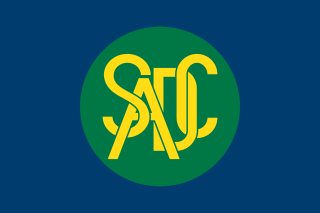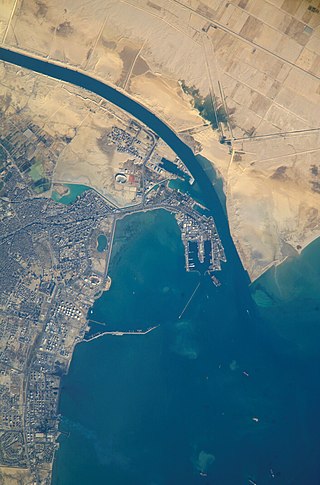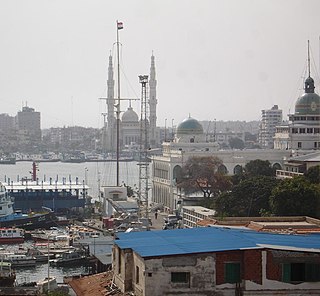
The Suez Canal is an artificial sea-level waterway in Egypt, connecting the Mediterranean Sea to the Red Sea through the Isthmus of Suez and dividing Africa and Asia. The 193.30-kilometre-long (120.11 mi) canal is a key trade route between Europe and Asia.

The Central European Free Trade Agreement (CEFTA) is an international trade agreement between countries mostly located in Southeastern Europe. Founded by representatives of Poland, Hungary and Czechoslovakia, CEFTA in 2006 expanded to Albania, Bosnia and Herzegovina, Bulgaria, Croatia, Moldova, Montenegro, North Macedonia, Romania, Serbia, Slovenia and the UNMIK.

The Southern African Development Community (SADC) is an inter-governmental organization headquartered in Gaborone, Botswana.

Suez Governorate is one of the governorates of Egypt. It is located in the north-eastern part of the country and is coterminous with the city of Suez. It is situated north of the Gulf of Suez.

Port Said Governorate is a subdivision located at the northeast end of the Nile Delta, on the coast of the Mediterranean Sea at the northern mouth of the Suez Canal. It is wholly urban, comprising the original Port Said city on the west bank of the Suez Canal, and the town of Port Fuad on the eastern bank, which makes it one of the few transcontinental metropolitans in the world, as it spans across two continents (Africa/Asia).

Europe, the Middle East and Africa, commonly known by its acronym EMEA among the North American business spheres, is a geographical region used by institutions, governments and global spheres of marketing, media and business when referring to this region. The acronym EMEA is a shorthand way of referencing the two continents and the Middle Eastern sub-continent all at once.
Economic nationalism or nationalist economics is an ideology that prioritizes state intervention in the economy, including policies like domestic control and the use of tariffs and restrictions on labor, goods, and capital movement. The core belief of economic nationalism is that the economy should serve nationalist goals. As a prominent modern ideology, economic nationalism stands in contrast to economic liberalism and economic socialism.

Port Fuad or Port Fouad is a city in Port Said Governorate, Egypt. Port Fuad is located in northeastern Egypt at the northwesternmost tip of the Sinai Peninsula on the Asian side of the Suez Canal, across from the city of Port Said. Port Fuad is considered a suburb of Port Said and together they form a metropolitan area of over one million residents. Along with the likes of Colón, Panama and Istanbul, Turkey (Asia/Europe), it is one of the few transcontinental cities in the world, in that spans it across two continents (Africa/Asia).

The Central American Integration System has been the economic and political organization of Central American states since 1 February 1993. On 13 December 1991, the ODECA countries signed the Protocol of Tegucigalpa, extending earlier cooperation for regional peace, political freedom, democracy and economic development. SICA's General Secretariat is in El Salvador.
Qualifying industrial zones (QIZs) are industrial parks that house manufacturing operations in Jordan and Egypt. The QIZ program was introduced in 1996 by the U.S. Congress to stimulate regional economic cooperation. Goods produced in QIZ-designated areas in Egypt, Jordan and the Palestinian territories can directly access U.S. markets without tariff or quota restrictions, subject to certain conditions. To qualify, goods produced in these zones must contain a small portion of Israeli input. In addition, a minimum 35% value to the goods must be added to the finished product. The idea was first proposed by Jordanian businessman Omar Salah in 1994.
Drinking water supply and sanitation in Egypt directly impact the country's public health, industrial developments, and agriculture. Egypt's water and sanitation industry is characterized by both achievements and challenges. Among the achievements are an increase of piped water supply between 1998 and 2006 from 89% to 100% in urban areas and from 39% to 93% in rural areas despite rapid population growth; the elimination of open defecation in rural areas during the same period; and in general a relatively high level of investment in infrastructure. Access to an at least basic water source in Egypt is now practically universal with a rate of 98%. On the institutional side, the regulation and service provision have been separated to some extensions through the creation of a national Holding Company for Water and Wastewater in 2004, and of an economic regulator, the Egyptian Water Regulatory Agency (EWRA), in 2006. Despite these successes, many challenges remain. Only about one half of the population is connected to sanitary sewers. Because of this low sanitation coverage, about 50,000 children die each year because of diarrhea. Another challenge is low cost recovery due to water tariffs that are among the lowest in the world. This in turn requires government subsidies even for operating costs, a situation that has been aggravated by salary increases without tariff increases after the Arab Spring. Furthermore, poor operation of facilities, such as water and wastewater treatment plants, as well as limited government accountability and transparency, are also issues.

Egypt–United Kingdom relations are the diplomatic, economic, and cultural relationships between Egypt and the United Kingdom. Relations are longstanding. They involve politics, defence, trade and education, and especially issues regarding the Suez Canal.

The Eurasian Economic Union is an economic union of five post-Soviet states located in Eurasia. The EAEU has an integrated single market. As of 2023, it consists of 183 million people and a gross domestic product of over $2.4 trillion.
Water supply and sanitation in Greece is characterised by diversity. While Athens receives its water from a series of reservoirs, some of which are located 200 km away, some small islands are supplied with water from tankers. Greeks have suffered from repeated droughts, the most recent one occurring in 2007. The EU supported the construction of numerous wastewater treatment plants since the 1990s in order to achieve EU environmental standards. While the wastewater discharge of the biggest cities is now in compliance with these standards, some smaller towns still lag behind.
A customs territory is a geographic territory with uniform customs regulations and there are no internal customs or similar taxes within the territory. Customs territories may fall into several types:

Ahmed Mahmoud Darwish is an Egyptian politician. He served as the first Chairman of the General Authority of Suez canal Economic Zone from 2015 to 2017. He previously served as Minister of State for Administration Development in the Nazif Cabinet between 2004 and 2011.
The 2018 Cyprus gas dispute is a diplomatic dispute involving the exclusive economic zone (EEZ) of the Republic of Cyprus in the eastern Mediterranean, which began on February 6, 2018. The dispute followed remarks made by Turkey's foreign minister Mevlüt Çavuşoğlu, rejecting a 2003 Cypriot-Egyptian maritime border demarcation deal and announcing the Turkish government's intention to carry out gas exploration in the region. Tensions in the region further escalated on February 9, when the Turkish Navy blocked a drill ship operated by Italian oil company Eni S.p.A., licensed by the government of the Republic of Cyprus, from exploring gas reserves off the island.

The Trump tariffs were protectionist trade initiatives during the Trump administration against Chinese imports. During the presidency of Donald Trump, a series of tariffs were imposed on China as part of his "America First" economic policy to reduce the United States trade deficit by shifting American trade policy from multilateral free trade agreements to bilateral trade deals. In January 2018, Trump imposed tariffs on solar panels and washing machines of 30 to 50 percent. In March 2018, he imposed tariffs on steel (25%) and aluminum (10%) from most countries, which, according to Morgan Stanley, covered an estimated 4.1 percent of U.S. imports. In June 2018, this was extended to the European Union, Canada, and Mexico. The Trump administration separately set and escalated tariffs on goods imported from China, leading to a trade war.











